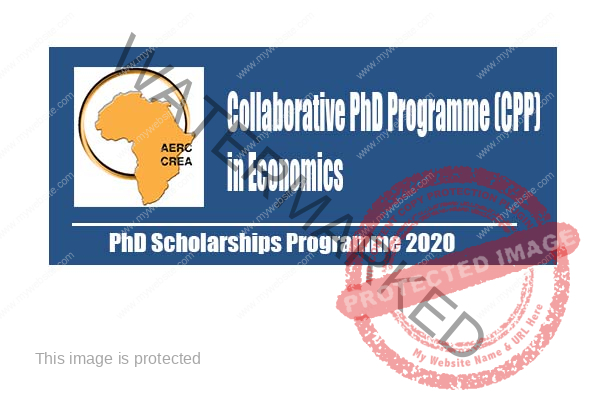Table of Contents
AERC Collaborative PhD Fellowship Programme 2020 application is now open to study economics. The Collaborative PhD Programme (CPP) in Economics’ primary aim is to strengthen teaching and research capacity in sub-Saharan African countries, to increase the pool of potential researchers and policy analysts, and to gradually build-up and retain African scholars
AERC’s Collaborative PhD Programme is to push students further, toward the contemporary intellectual frontiers of knowledge through a series of intensive courses taught by African scholars and leading international experts
About AERC Collorative PhD Programme
Launched in 2002, CPP aims to increase output of professionals conversant with – and specialists in – African issues, leading to the possible emergence of various theories and African solutions to these problems. CPP integrates theory, tools and African applications into academic teaching, ensuring that theory is firmly grounded on the empirical side.
Application Deadline
The AERC Collaborative PhD Fellowship Program application closes July 31, 2020 for the December award.
Values/Benefits
For successful applicants, AERC Collaborative PhD Fellowship is fully funded.
Duration: Collaborative PhD Programme is a four-year post-MA that makes maximum use of international and African experts assembled periodically to interact with students in centralized locations through each of the last three academic years.
Course/Subject: List of Approved CPP Elective Courses
- Agricultural Economics
- Industrial Economics
- Development Economics
- International Economics
- Econometrics
- Labour Economics
- Environmental Economics
- Monetary Economics
- Financial Economics
- Public Sector Economics
- Health Economics
Host Degree-Awarding Universities
The below universities that have been assigned the responsibility of teaching the given courses in core fields and administering comprehensive examinations to all students admitted into the programme. There is one host degree-awarding university per region. They are:
- University of Cape Town, Southern Africa
- University of Dar es Salaam, Tanzania (Eastern Africa)
- University of Ibadan, Nigeria (Anglophone, Western Africa)
- University of Yaoundé II, Cameroon (Francophone Africa)
Non-Host Degree-awarding universities (DAUs)
These are the additional universities that upon admitting students, send them to the regional host universities to take core courses and thereafter to a central facility – the Joint Facility for Electives (JFE) – to take elective courses, organize the supervision and production of student PhD theses and award the degrees to successful students. They are:
- University of Witwatersrand, Southern Africa)
- University of Nairobi, Kenya (Eastern Africa)
- University of Benin, Nigeria (Western Africa)
- Université Félix Houphouët-Boigny, Cote D’Ivoire (Francophone Africa)
Requirements and Eligibility Criteria
To be qualified for support from AERC, candidates must:
- Have applied and been admitted to any one of the listed CPP degree-awarding universities;
- Have attained at Bachelor’s Degree level at least a Second Class Honours (Upper Division) or equivalent in Economics or related field from an accredited university;
- Have a Masters Degree (with coursework and thesis component) in Economics, Agricultural Economics or related fields from a recognized University. The coursework should have covered microeconomics, macroeconomics and quantitative methods;
- Female and applicants from post-conflict and fragile states are encouraged to apply.
Possession of at least 1 relevant publication in a refereed journal will be an added advantage. - Evidence of engagement in economic management, research and/or training in the public sector will be an added advantage.
Documentation Required
The following documents need to be included in your application:
Upon receipt of an admission letter from the specific university, candidates should submit the following to our training division at training@aercafrica.org
- Application for scholarship
- A copy of the admission letter
- Curriculum vitae
- Certified copies of academic certificates and transcripts
Requests should be supported by the following documentation:
- Evidence of an attachment to, or sponsorship by, an institution in sub-Saharan Africa engaged in economic management, research and/or training in the public sector in the region
- Evidence of registration in a recognized PhD programme in economics
- An approved research proposal, complete with clearly defined objectives, substantial literature review and a well-outlined analytical framework, as well as pertinent research methodology
- A statement of limitations and policy relevance of the study
- A letter of reference from the thesis supervisor
- A detailed budget including evidence of any additional financial support that may be necessary to complete CPP
- Curriculum vitae
How to Apply
Application procedures can be obtained from the respective universities’ websites or https://aercafrica.org/training/cpp. Interested candidates should direct their applications for admission to the degree-awarding universities whose addresses and contact information the website.
Need More Information?
Get further details, visit the AERC Collaborative PhD Fellowship Programme official website.
Like This Opportunities? Do well to let us know how helpful it is and share with friends on social media websites.
Follow us now on Facebook page and Twitter.
Also, Subscribe to our free mail notification to be among the first to receive interesting updates.

